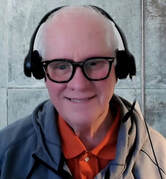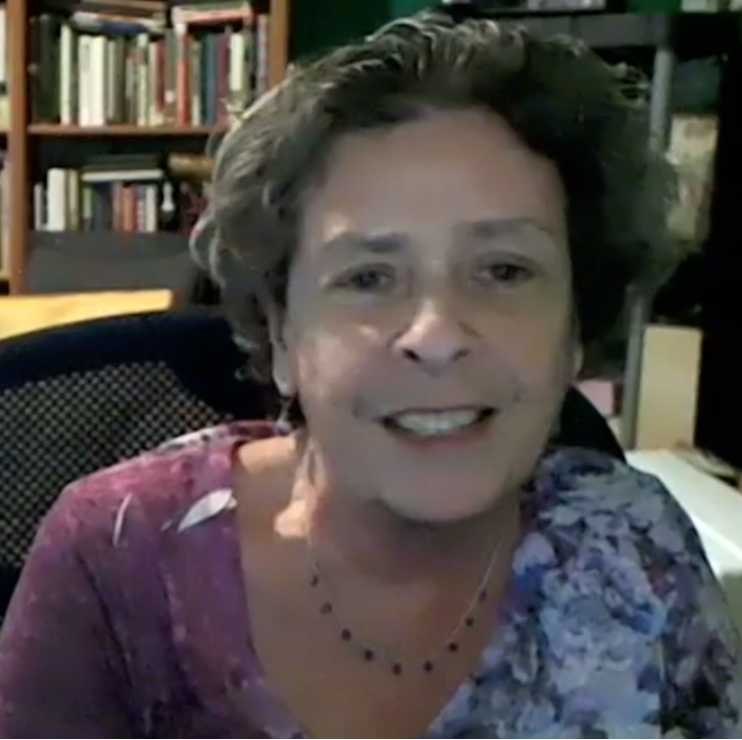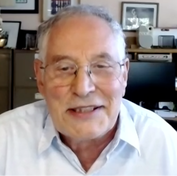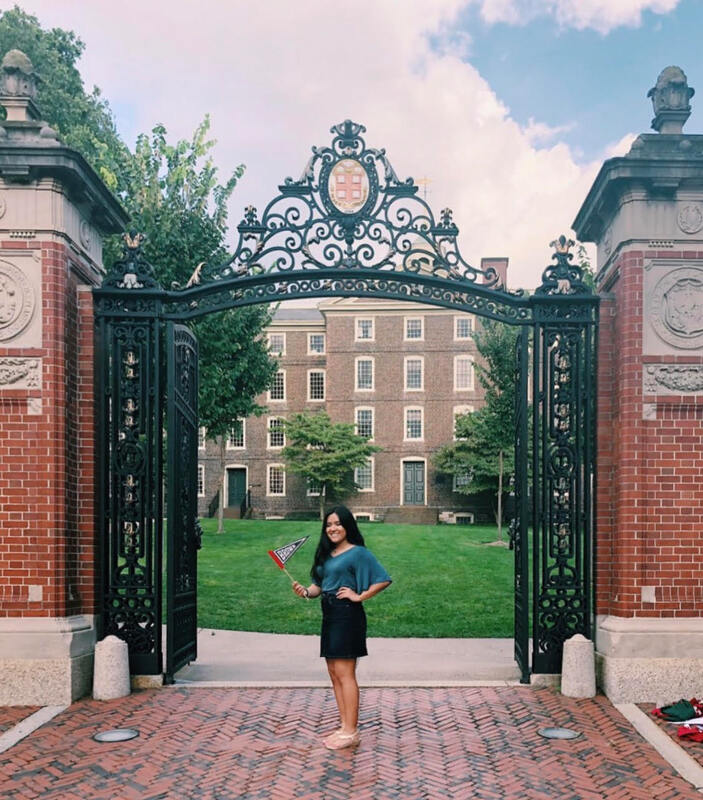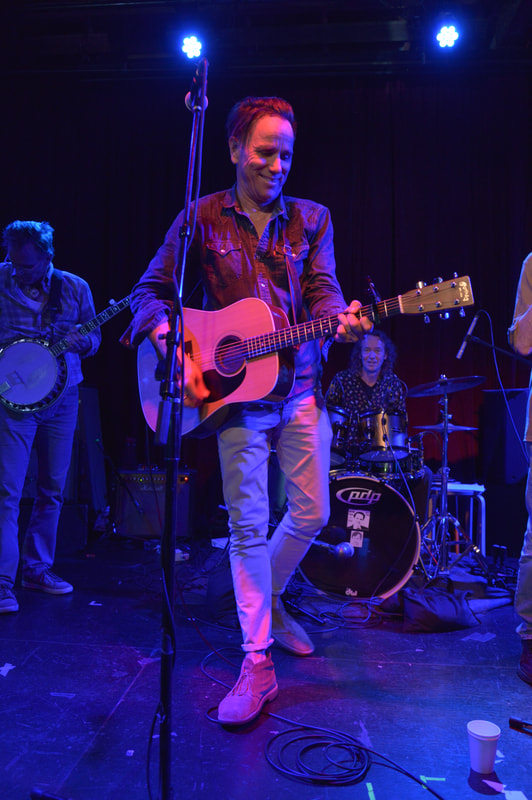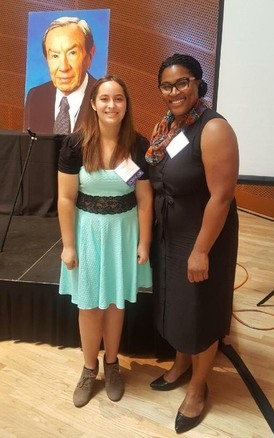Robert Brooks: Computer Maestro, Physician and Educator
|
Meet Robert Brooks, our webmaster extraordinaire. It’s not an exaggeration to say that this site wouldn’t exist without Bob’s technical know-how, patience, and dogged determination. Not to mention his good humor and grace under pressure.
Bob is a man of many talents. As a youngster, he studied music with renowned pianist Colette Nance and composer Mabel Woodworth. As a physician in the 1980s, he opened one of the first medical practices devoted to the treatment of AIDS patients in West Hollywood, California. After retiring from medicine, Bob turned a passion for education into a second career. He became a grant administrator, and teacher of English as a second language (ESL). For the past 18 years, Bob has been Academic Coordinator for the after school program L.A.C.E.R. (Literacy, Arts, Culture, Education and Recreation), which operates in Los Angeles at four middle schools and four high schools. |
It was at L.A.C.E.R. that I first met Bob. It didn’t take long to learn that he had strong ideas about educating students and was willing to go to the mat to fight for them. At the center of his philosophy is the belief that students need to be continually challenged. “Set high expectations for our students,” he would tell me, “and they will surpass them.”
To support students and tutors, Bob created an academic section of the L.A.C.E.R. website where he has posted literally hundreds of activities and educational articles. Safe to say that Bob knows more about current thinking in education than most other educators.
It was because of Bob’s work at L.A.C.E.R. that I asked him to join me and one of our original volunteers, Rhonda Rundle, former writer for the Wall Street Journal, to create our website. At that point, we had been struggling for years to get a site up and running. I can remember Rhonda telling me after meeting Bob, “I think this will finally happen.” And indeed, it has.
Every month or so, we update the site with news, profiles of students and volunteers, and announcements of volunteer opportunities. Rhonda is our editor, Bob our webmaster. Together, we strive to capture our grassroots soulfulness while maintaining a professional appearance. I am lucky to call Bob a good friend as well as a colleague. His life story, accomplishments, passion for learning and love for new challenges continue to inspire me.
–Susan Philips
To support students and tutors, Bob created an academic section of the L.A.C.E.R. website where he has posted literally hundreds of activities and educational articles. Safe to say that Bob knows more about current thinking in education than most other educators.
It was because of Bob’s work at L.A.C.E.R. that I asked him to join me and one of our original volunteers, Rhonda Rundle, former writer for the Wall Street Journal, to create our website. At that point, we had been struggling for years to get a site up and running. I can remember Rhonda telling me after meeting Bob, “I think this will finally happen.” And indeed, it has.
Every month or so, we update the site with news, profiles of students and volunteers, and announcements of volunteer opportunities. Rhonda is our editor, Bob our webmaster. Together, we strive to capture our grassroots soulfulness while maintaining a professional appearance. I am lucky to call Bob a good friend as well as a colleague. His life story, accomplishments, passion for learning and love for new challenges continue to inspire me.
–Susan Philips
One Life at a Time: Zoom Tutoring by Educational Student Tours
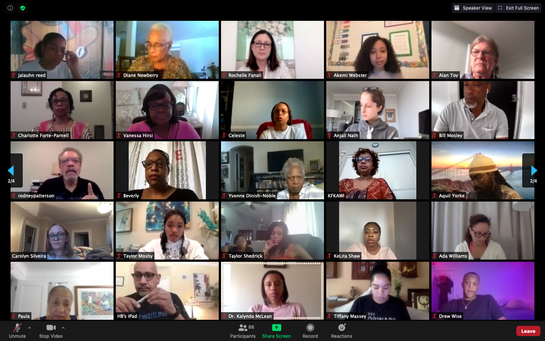
On September 5, 2020, Dr. Yasmin Delahoussaye, beginning a Zoom session for mentors training to assist students with their college application essays, showed a short video.
The film tells the story of a boy on a beach throwing washed up starfish into an ocean. Nearby, a puzzled man tells the boy his efforts won’t make much of a difference to the multitudes of stranded sea stars.
Undeterred, the boy picks up another starfish, flings it into the ocean, and patiently tells the man: “It made a difference to that one!”
It was the perfect lead in for volunteers who spent part of a Saturday afternoon preparing to help college applicants. But it came as a major adjustment for Yasmin, a former community college counselor, vice chancellor, college president, and co-founder of Educational Student Tours (EST) whose annual tours of Historically Black Colleges and Universities (HBCUs) for low income and foster youth have been grounded for the first time in the 33 years she and her husband Gregory have been organizing the trips.
The film tells the story of a boy on a beach throwing washed up starfish into an ocean. Nearby, a puzzled man tells the boy his efforts won’t make much of a difference to the multitudes of stranded sea stars.
Undeterred, the boy picks up another starfish, flings it into the ocean, and patiently tells the man: “It made a difference to that one!”
It was the perfect lead in for volunteers who spent part of a Saturday afternoon preparing to help college applicants. But it came as a major adjustment for Yasmin, a former community college counselor, vice chancellor, college president, and co-founder of Educational Student Tours (EST) whose annual tours of Historically Black Colleges and Universities (HBCUs) for low income and foster youth have been grounded for the first time in the 33 years she and her husband Gregory have been organizing the trips.
|
Yasmin and Deborah Kaye, a CollegePath LA volunteer, were colleagues when both worked in the Los Angeles Community College District on critical accreditation reports, Deborah as an educator, Yasmin as an administrator. Separately, Deborah and her husband, Jeffrey, have worked for several years with CollegePath LA, including three years at Los Angeles Valley College where they led a program for would-be transfer students. This year, after EST canceled its tours, the three colleagues agreed the time was ripe for collaboration.
“It was the perfect storm,” Yasmin said, “because people were at home and looking for ways to make a difference.” Yasmin went to work recruiting and interviewing students (several of whom are the children of the 4,500 people who have benefitted from EST over the years!). To find mentors, she put out the word to friends and colleagues and to companies including Valero and Sony. Deborah and Jeffrey also recruited volunteers. The word spread. Professionals — retired and active — signed up. An admissions officer from USC agreed to participate, and by October 5, when Jeffrey, a writer and former journalist, began an online training session for mentors and students, some 80 people took part. Afterwards, they went into follow-up breakout sessions — one-on-one workshops in which students and mentors began to work together. |
|
These difficult times created a sense of urgency among volunteers and a palpable desire to be constructive. The pandemic has exacerbated existing inequities — gaps that have been evident as many students continue to grapple with unstable Internet or phone connections.
Despite ongoing communication difficulties, the feedback from students and mentors has been favorable. Mentors are assisting with scholarship applications and reviewing essays by email. The trio plans to get a fuller picture of the program’s impact by asking participants to fill out evaluation forms. But even without formal assessments, the benefits are clear. The students are often the first in their families |
to apply to college. They lack the resources of wealthier households, for whom a growing industry — essay coaching, sometimes costing as much as $2,000 for a package — has become a normal part of the college admissions process.
All of the volunteers in the program are aware of its limitations and of the huge need for educational equity. But participants say they are inspired by the students’ abilities and determination. Mentors see the light-bulbs going on when they discuss ideas, and delight in the sense of accomplishment students show as they complete their assignments. The volunteers know there is only so much they can do, but as individuals assisting other individuals, they are making a difference. By Jeffrey and Deborah Kaye |
Elvia Perez, a recent Marshall alumna, tells us
what she has been doing during the COVID-19 pandemic.
what she has been doing during the COVID-19 pandemic.
|
Question: What are you doing now? Tell us about your website---why did you decide to make one, who is your audience, how do you update it?
Hopeless. That is how I felt a few days into quarantine. My school was on “spring break,” so I had plenty of time on my hands. I kept asking myself what I could do to help people during this time. A good friend had taught me that we as human beings have an obligation to help others, and I could not agree more. I have come to believe that no matter how severe a situation might seem, there are always things we can do to help. As a first-generation, low-income student, something I am very passionate about is ensuring people have access to the tools and resources they need. In high school, I built a nonprofit organization that helps students gain access to higher education and essentially improve the quality of their lives. I created a website that listed some of the most prominent scholarships, summer programs, and internship opportunities for low-income students. Thinking back to that project, I realized that building a centralized website with COVID-19 resources would not only be helpful- as many individuals were in desperate need of resources- but it would also make sense given my prior experience. I began by compiling a list of COVID-19 government, educational, health, and housing resources. One of the best ways to make it easy for people to find these incredible resources was to consolidate them on a single website. Initially, the site was aimed at the Providence, Rhode Island, community. I have a friend who is coordinating BRYTE (a nonprofit refugee tutoring organization in Providence), who could send the website link to students and their parents. After much consideration, I decided to broaden the audience to include everyone in the U.S. An individual looking for food resources can click on the Find Local Food Banks button and will be directed to Feeding America’s Finding Your Local Food Bank page, which is searchable by state or zip code. With news moving quickly, I was aware from the beginning of the project that it would not be feasible to constantly update the website. That is why there are links on the site that redirect users to official sites, including the CDC’s current live COVID-19 cases in the U.S and the latest New York Times virus maps. I update the website once a week, posting new resources and articles. Question: What college are you going to? When did you graduate? What is your major? Why did you choose it? What are your career goals? I am a sophomore at Brown University, where I am studying business economics and political science. As a first-generation, low-income student, my goal is to provide financial stability for my family, while working to improve and give back to my community. I aspire to advocate for low-income families and combat issues of social injustice through active involvement in organizations and government. I want to use my education in Business Economics and Political Science to address the most pressing problems in our communities, such as crime, unjust immigration policies and educational inequalities. Government, in my eyes, is one of the best ways to achieve progress and positive in my community, our nation, and the world. |
“The best way to not feel hopeless is to get up and do something. Don’t wait for good things to happen to you. If you go out and make some good things happen, you will fill the world with hope, you will fill yourself with hope.” - President Barack Obama
As a Social Innovation Fellow at Brown, I am creating an educational technology startup: EmpowerU.
EmpowerU addresses the barriers that prevent low-income students from accessing the resources they need to obtain a higher education. I strongly believe that education is the best way to empower our communities, enabling us to break the perpetual cycle of crime and poverty within them. EmpowerU provides access to scholarships, internships, summer programs, local nonprofit organizations, and other resources. It gives students the tools, community, and mentorships they need to succeed when seeking out opportunities and applying to colleges. As a first-generation, low-income student, I see the importance of helping all students acquire higher education, as it creates a path towards economic mobility and a higher standard of living. According to the U.S. Department of Education, half of Americans from high-income families hold a bachelor’s degree by age 25, but only 1 in 10 people from low-income families attain that level of education. Question: How were you involved with CollegePath LA? What did we offer that helped you? When I was in high school, I had the life-changing opportunity to work with CollegePath LA. I can genuinely say that I would not be at Brown University today if it were not for their immense help and unconditional support. I received tremendous guidance throughout my college application process from incredible mentors like Susan Philips and Jon Hartmere. They not only helped revise my college essays, but they also gave me so much hope and encouragement. They motivated me to dedicate my life to doing everything I can to improve the quality of people’s lives. They changed my life for the better and enabled me to build a better future for me, my family, and my community. For that, I am eternally grateful to CollegePath LA. |
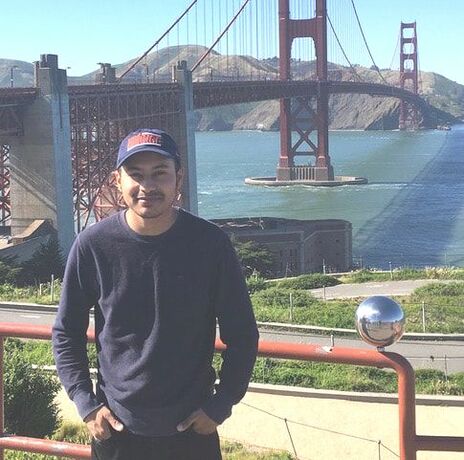
The College Journey of Gregory Contreras, CollegePath LA Alumnus
Seven years ago, Gregory Contreras was a senior at John Marshall High School, waiting to hear from dozens of colleges to which he had applied. Now, he is set to graduate from the University of Southern California with a Master of Arts degree in economics.
Looking back on his journey, Gregory attributes his success to a combination of both personal qualities and lessons he has learned along the way. He has always tried to give himself options; he is resilient; and he has discovered the power of setting goals and asking for help.
In 2012, Gregory was initially set to attend San Diego State, which offered an undergraduate major in television, radio and film. He had already submitted a deposit when he received an intriguing offer from Syracuse University in upstate New York. He could attend with a solid financial aid package if he was willing to delay his start until the following spring.
It was a difficult decision. “I asked myself: Which choice would I regret?” he recalls. He figured he had lived his entire life in California, so he wouldn’t regret not attending San Diego State. Syracuse, on the other hand, presented an opportunity that he would always wonder about if he didn’t take.
His thinking was influenced by a trip to Boston in pursuit of a scholarship to another eastern college. He didn’t get the award, but the trip whetted his appetite for adventure. He traveled there with Susan Philips, CollegePath LA’s executive director. When he received the Syracuse offer, he consulted Susan. “You need to go,” she told him.
Gregory started to visualize himself at Syracuse. He knew it was really cold there. He would experience snow. He felt lucky and excited by the prospect of living in a new place. He viewed the delayed start as a plus. He would work and save money over the summer and fall to supplement his finances. CollegePath LA bought him a winter coat!
At Syracuse, Gregory enrolled as a psychology major in the college of arts and sciences. His goal was to transfer into the university’s prestigious communications school that offers majors in television, radio and film. “That was a big thing in my head,” he says. He buckled down and worked hard. “I was very strategic in choosing classes.” He needed to achieve a strong GPA to give himself the best shot of admission.
In the spring of 2014 he successfully transferred into the S.I. Newhouse School of Public Communications. He started learning about careers in the field, and the difficulties of breaking into radio, movies or television. It was daunting. He enjoyed writing, and thought about becoming a screenwriter, but he also wanted a regular job that would provide a good living.
“I wanted to have options,” he says. He started exploring courses in other areas that interested him. He was attracted to economics. It required analytical thinking about how the world works. Screenwriting started to feel more like a hobby than a career after college, he says. At the end of his junior year, he started thinking about graduate school in economics.
He contacted Susan Philips for advice. She lit a match under him. “I needed to kick into another gear,” he says. He needed to take the Graduate Record Examination (GRE). He needed letters of recommendation. He had been slacking off and needed to ramp up the studying to achieve top grades his senior year.
He bought a GRE practice book and started studying. On weekends he set an alarm to get up by 6 am to take a practice test. This routine simulated the real exam situation. He corrected each test and studied the questions he got wrong. Over four or five weeks he saw his results steadily improve. He knew he had to achieve a certain score to be a competitive applicant to graduate programs.
Gregory is shy, and asking for recommendations wasn’t easy for him. But with Susan’s encouragement, he contacted a professor he respected whose course he had taken the previous semester. “He was so much more helpful than I expected. He was really interested,” Gregory says. Not only did the professor write a recommendation, he became Gregory’s mentor and guide.
“He gave me confidence to apply to USC,” Gregory says. “I didn’t think I would get in.” The professor helped Gregory narrow his list to six programs, including two PhD programs. When the acceptances arrived, Gregory decided to attend USC, even though it was more expensive than other options and would mean adding to his debt load. He graduated from Syracuse in December 2016 with a double major in Economics and Television, Radio & Film.
During most of his academic career, Gregory has juggled classes and jobs to make ends meet. During his first year of graduate school he worked full-time as an assistant manager at Walgreens. In this role, he was in charge of employee scheduling, including his own. He lived with his mother and older brother in the San Fernando Valley, worked in Echo Park, and attended classes at USC.
“School got harder,” he says. He wanted to focus on his classes, so he stopped working his second year at USC. After the first or second semester, he had realized that he didn’t want to spend another six years pursuing a PhD, so he will graduate this spring with a Master’s degree. "I want to be out in the working world. I like having money in my pocket,” he says.
Soon, Gregory will be facing his next hurdle: Finding a job. He’s mulling his options in consulting, finance and banking. He is attending discussions with real world professionals brought in by USC faculty to talk to students about what they do. Gregory is confident that the skills he has learned in his college journey, thinking ahead, networking and setting goals, will help him forge a satisfying career.
Students mistakenly think the challenges end when they get into college, he says. “You have to keep giving yourself options, planning and setting goals.”
Seven years ago, Gregory Contreras was a senior at John Marshall High School, waiting to hear from dozens of colleges to which he had applied. Now, he is set to graduate from the University of Southern California with a Master of Arts degree in economics.
Looking back on his journey, Gregory attributes his success to a combination of both personal qualities and lessons he has learned along the way. He has always tried to give himself options; he is resilient; and he has discovered the power of setting goals and asking for help.
In 2012, Gregory was initially set to attend San Diego State, which offered an undergraduate major in television, radio and film. He had already submitted a deposit when he received an intriguing offer from Syracuse University in upstate New York. He could attend with a solid financial aid package if he was willing to delay his start until the following spring.
It was a difficult decision. “I asked myself: Which choice would I regret?” he recalls. He figured he had lived his entire life in California, so he wouldn’t regret not attending San Diego State. Syracuse, on the other hand, presented an opportunity that he would always wonder about if he didn’t take.
His thinking was influenced by a trip to Boston in pursuit of a scholarship to another eastern college. He didn’t get the award, but the trip whetted his appetite for adventure. He traveled there with Susan Philips, CollegePath LA’s executive director. When he received the Syracuse offer, he consulted Susan. “You need to go,” she told him.
Gregory started to visualize himself at Syracuse. He knew it was really cold there. He would experience snow. He felt lucky and excited by the prospect of living in a new place. He viewed the delayed start as a plus. He would work and save money over the summer and fall to supplement his finances. CollegePath LA bought him a winter coat!
At Syracuse, Gregory enrolled as a psychology major in the college of arts and sciences. His goal was to transfer into the university’s prestigious communications school that offers majors in television, radio and film. “That was a big thing in my head,” he says. He buckled down and worked hard. “I was very strategic in choosing classes.” He needed to achieve a strong GPA to give himself the best shot of admission.
In the spring of 2014 he successfully transferred into the S.I. Newhouse School of Public Communications. He started learning about careers in the field, and the difficulties of breaking into radio, movies or television. It was daunting. He enjoyed writing, and thought about becoming a screenwriter, but he also wanted a regular job that would provide a good living.
“I wanted to have options,” he says. He started exploring courses in other areas that interested him. He was attracted to economics. It required analytical thinking about how the world works. Screenwriting started to feel more like a hobby than a career after college, he says. At the end of his junior year, he started thinking about graduate school in economics.
He contacted Susan Philips for advice. She lit a match under him. “I needed to kick into another gear,” he says. He needed to take the Graduate Record Examination (GRE). He needed letters of recommendation. He had been slacking off and needed to ramp up the studying to achieve top grades his senior year.
He bought a GRE practice book and started studying. On weekends he set an alarm to get up by 6 am to take a practice test. This routine simulated the real exam situation. He corrected each test and studied the questions he got wrong. Over four or five weeks he saw his results steadily improve. He knew he had to achieve a certain score to be a competitive applicant to graduate programs.
Gregory is shy, and asking for recommendations wasn’t easy for him. But with Susan’s encouragement, he contacted a professor he respected whose course he had taken the previous semester. “He was so much more helpful than I expected. He was really interested,” Gregory says. Not only did the professor write a recommendation, he became Gregory’s mentor and guide.
“He gave me confidence to apply to USC,” Gregory says. “I didn’t think I would get in.” The professor helped Gregory narrow his list to six programs, including two PhD programs. When the acceptances arrived, Gregory decided to attend USC, even though it was more expensive than other options and would mean adding to his debt load. He graduated from Syracuse in December 2016 with a double major in Economics and Television, Radio & Film.
During most of his academic career, Gregory has juggled classes and jobs to make ends meet. During his first year of graduate school he worked full-time as an assistant manager at Walgreens. In this role, he was in charge of employee scheduling, including his own. He lived with his mother and older brother in the San Fernando Valley, worked in Echo Park, and attended classes at USC.
“School got harder,” he says. He wanted to focus on his classes, so he stopped working his second year at USC. After the first or second semester, he had realized that he didn’t want to spend another six years pursuing a PhD, so he will graduate this spring with a Master’s degree. "I want to be out in the working world. I like having money in my pocket,” he says.
Soon, Gregory will be facing his next hurdle: Finding a job. He’s mulling his options in consulting, finance and banking. He is attending discussions with real world professionals brought in by USC faculty to talk to students about what they do. Gregory is confident that the skills he has learned in his college journey, thinking ahead, networking and setting goals, will help him forge a satisfying career.
Students mistakenly think the challenges end when they get into college, he says. “You have to keep giving yourself options, planning and setting goals.”
Leaders Head to College
A special shoutout to five CollegePath LA committee members who are set to graduate from John Marshall High School on June 9, 2017. The committee, which meets weekly on campus, plays a vital role in supporting our program. Student participants help plan, promote and staff events, including workshops to write college essays, complete financial aid forms and explore professional careers.
Following graduation, the students join CollegePath LA’s alumni group and return to Marshall periodically to tell students about their college experiences. CollegePathLA organized the committee in 2011 to create student leadership opportunities and to strengthen connections with the volunteer community.
Heading to college this fall:
Gerson Matamoros, co-chair: University of Southern California
Kevin Bacon: University of California, Irvine
Janet Choi: University of California, San Diego
Janelle Dela Cueva: University of California, San Diego
Mara Soriano: University of California, Merced
Here are some committee members’ thoughts about their CollegePathLA experience.
“Being a part of CollegePath LA, I learned that in my community there's always going to be someone who is willing to help, and that helping other people is an important part of being in a community.
I also learned how to collaborate in a group and to plan events. This had a really big impact on my self-esteem because it showed me that my input mattered and that I had good ideas.”
---Janelle Dela Cueva
“As part of the committee, I had to encourage students to come to our events. Because of this, I learned how to deliver a message. I gained more confidence in front of others.”
---Kevin Bacon
“I learned how to network and make connections. I was able to use these skills at the career fair when I had to go up to people and tell them about myself.” ---Maria Soriano
“I learned social skills by walking up to random people and asking them to come to our events.”
---Janet Choi
A special shoutout to five CollegePath LA committee members who are set to graduate from John Marshall High School on June 9, 2017. The committee, which meets weekly on campus, plays a vital role in supporting our program. Student participants help plan, promote and staff events, including workshops to write college essays, complete financial aid forms and explore professional careers.
Following graduation, the students join CollegePath LA’s alumni group and return to Marshall periodically to tell students about their college experiences. CollegePathLA organized the committee in 2011 to create student leadership opportunities and to strengthen connections with the volunteer community.
Heading to college this fall:
Gerson Matamoros, co-chair: University of Southern California
Kevin Bacon: University of California, Irvine
Janet Choi: University of California, San Diego
Janelle Dela Cueva: University of California, San Diego
Mara Soriano: University of California, Merced
Here are some committee members’ thoughts about their CollegePathLA experience.
“Being a part of CollegePath LA, I learned that in my community there's always going to be someone who is willing to help, and that helping other people is an important part of being in a community.
I also learned how to collaborate in a group and to plan events. This had a really big impact on my self-esteem because it showed me that my input mattered and that I had good ideas.”
---Janelle Dela Cueva
“As part of the committee, I had to encourage students to come to our events. Because of this, I learned how to deliver a message. I gained more confidence in front of others.”
---Kevin Bacon
“I learned how to network and make connections. I was able to use these skills at the career fair when I had to go up to people and tell them about myself.” ---Maria Soriano
“I learned social skills by walking up to random people and asking them to come to our events.”
---Janet Choi
Sharon Stricker Achievement Award 2016
Susan Philips, director and co-founder of CollegePath LA, is being honored for her contributions in developing college and career access programs at two Los Angeles high schools.
The award will be made on Sunday, November 13, at the 21st annual L.A.C.E.R. Afterschool Program fundraiser brunch. Susan will receive the Sharon Stricker Achievement Award for her efforts at Hollywood High School and Fairfax High School.
L.A.C.E.R. (short for Literacy, Arts, Culture, Education & Recreation) was founded in 1995 to provide underserved students at Los Angeles middle and high schools with free arts, athletics and academic activities after school.
Sharon Stricker, L.A.C.E.R. co-founder and former executive director, will present the award. Offering students help with college and career exploration has long been a dream of Sharon’s. Susan will be the first recipient of the award.
The fundraiser brunch will be held on Sunday, November 13 at 11 a.m. at the Avalon Hollywood, 1735 Vine Street, Hollywood. Click here for more information, to register for the event, or to make a donation.
Susan Philips, director and co-founder of CollegePath LA, is being honored for her contributions in developing college and career access programs at two Los Angeles high schools.
The award will be made on Sunday, November 13, at the 21st annual L.A.C.E.R. Afterschool Program fundraiser brunch. Susan will receive the Sharon Stricker Achievement Award for her efforts at Hollywood High School and Fairfax High School.
L.A.C.E.R. (short for Literacy, Arts, Culture, Education & Recreation) was founded in 1995 to provide underserved students at Los Angeles middle and high schools with free arts, athletics and academic activities after school.
Sharon Stricker, L.A.C.E.R. co-founder and former executive director, will present the award. Offering students help with college and career exploration has long been a dream of Sharon’s. Susan will be the first recipient of the award.
The fundraiser brunch will be held on Sunday, November 13 at 11 a.m. at the Avalon Hollywood, 1735 Vine Street, Hollywood. Click here for more information, to register for the event, or to make a donation.
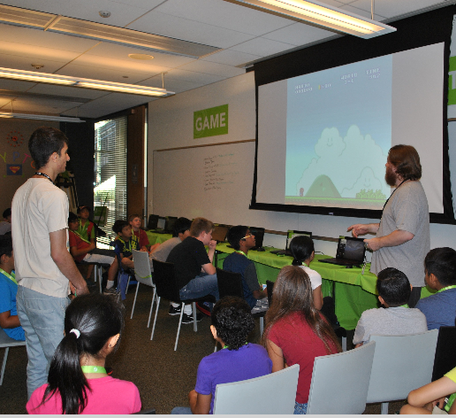
Eric Palyan
Marshall Class of 2012
Over the summer I was a paid instructor at iD Tech camp, which introduces kids to robotics, film, programming and game design, among other technologies. I worked at both UCLA and Caltech, alternating between the two campuses.
The students, ranging in age from eight to 17, had signed up for weeklong sessions. I have a lot of experience with technology and consider myself a fairly big geek. As a result of this knowledge, I was asked to teach a different course almost every week.
I heard about the job at the University of California, Santa Barbara, where I’m a senior this year, majoring in computer science. I completed an online application (https://www.idtech.com/jobs) and was selected for a telephone interview. One of the questions was, “What would you nickname yourself?” I replied, “Binary,” which became my name at camp.
Having the opportunity to pass my knowledge on to a younger generation was one of the most rewarding experiences of my life. I will always remember the smiles on those kids’ faces. The iD Tech staff was extremely supportive and spread nothing but positive vibes.
Among the programming languages I taught were C++, Java and Objective C. I also taught game design and development software, including Unity, Unreal Engine 4 and Shootmania. Teaching so many different subjects was a great experience, but very challenging. I had to prepare a completely new lesson plan every week.
We usually spent the first half of the week learning new concepts and getting accustomed to the software. The remaining half I helped students brainstorm ideas for their own personal projects. Kids love being creative. From there on out I would guide them as they completed their projects.
On Fridays, the last day of each session, we had a big family showcase. Family and friends would come check out all the awesome knowledge the students learned and applied to their own creations. The level of excitement was always high and it is an experience I won’t ever forget.
By Eric Palyan
UC Santa Barbara (graduation expected 2016)
Marshall Class of 2012
Over the summer I was a paid instructor at iD Tech camp, which introduces kids to robotics, film, programming and game design, among other technologies. I worked at both UCLA and Caltech, alternating between the two campuses.
The students, ranging in age from eight to 17, had signed up for weeklong sessions. I have a lot of experience with technology and consider myself a fairly big geek. As a result of this knowledge, I was asked to teach a different course almost every week.
I heard about the job at the University of California, Santa Barbara, where I’m a senior this year, majoring in computer science. I completed an online application (https://www.idtech.com/jobs) and was selected for a telephone interview. One of the questions was, “What would you nickname yourself?” I replied, “Binary,” which became my name at camp.
Having the opportunity to pass my knowledge on to a younger generation was one of the most rewarding experiences of my life. I will always remember the smiles on those kids’ faces. The iD Tech staff was extremely supportive and spread nothing but positive vibes.
Among the programming languages I taught were C++, Java and Objective C. I also taught game design and development software, including Unity, Unreal Engine 4 and Shootmania. Teaching so many different subjects was a great experience, but very challenging. I had to prepare a completely new lesson plan every week.
We usually spent the first half of the week learning new concepts and getting accustomed to the software. The remaining half I helped students brainstorm ideas for their own personal projects. Kids love being creative. From there on out I would guide them as they completed their projects.
On Fridays, the last day of each session, we had a big family showcase. Family and friends would come check out all the awesome knowledge the students learned and applied to their own creations. The level of excitement was always high and it is an experience I won’t ever forget.
By Eric Palyan
UC Santa Barbara (graduation expected 2016)
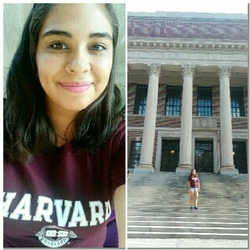
Rocio Del Cid
Marshall Class of 2014
My experience working this summer at Harvard Medical School and Boston Children’s Hospital was the most academically challenging experience of my life. It felt like I was in another world...and I loved it! I met so many wonderful, intelligent people full of dedication.
My mentor was Dr. Maria Lehtinen, whose lab is part of the Department of Pathology at Boston Children's Hospital. Her neuroscience research focuses on the mechanisms that regulate brain development and neural stem cell specification. The lab is affiliated with Harvard Medical School and shares instruments with another HMS lab.
It was inspiring to work with Dr. Lehtinen, a woman scientist who has overcome personal hardships of her own. She pushed me to master concepts/techniques at a pace I would never have thought myself capable. I studied circadian gene expression in the choroid plexus of the mammalian embryonic brain using a mouse model. I learned to handle mice and dissect their brains.
At the end of my research and cramming study sessions with other HMS students, I marveled to myself: "Hey, you got this!" Near the end, I was engaging actively in discussions and contributing ideas. I presented my research at the National Institutes of Health in Bethesda, Maryland and was invited to visit inside the White House in Washington D.C.
My mentor was impressed with my work and invited me to return. So next summer I will be working at Harvard again!
I learned about this summer opportunity, called STEP-UP, through the coordinator of the Latino and African American Internship Program at Children's Hospital Los Angeles. Both LA-HIP and STEP-UP are for high school students. STEP-UP accepts undergraduate students as well. The application consists of a personal statement, a few short essay questions, transcripts, and two letters of recommendation (for college students one has to come from a professor).
STEP-UP provides a $4,500 stipend for the summer. The program paid for all of my travel expenses from LA to Boston and then to Maryland/Washington D.C and back home. In Boston I rented a room in an apartment with two other Harvard medical students that I found on Facebook (there is a page where people post rentals and summer sublets). I used my stipend to cover my rent expense.
Boston is a beautiful city! I also visited New York, New Hampshire, Rhode Island, Cape Cod and Nantucket Island. Now, I really wish I had applied to colleges in the East Coast. I wouldn't mind living in the East for graduate school...who knows!
Marshall Class of 2014
My experience working this summer at Harvard Medical School and Boston Children’s Hospital was the most academically challenging experience of my life. It felt like I was in another world...and I loved it! I met so many wonderful, intelligent people full of dedication.
My mentor was Dr. Maria Lehtinen, whose lab is part of the Department of Pathology at Boston Children's Hospital. Her neuroscience research focuses on the mechanisms that regulate brain development and neural stem cell specification. The lab is affiliated with Harvard Medical School and shares instruments with another HMS lab.
It was inspiring to work with Dr. Lehtinen, a woman scientist who has overcome personal hardships of her own. She pushed me to master concepts/techniques at a pace I would never have thought myself capable. I studied circadian gene expression in the choroid plexus of the mammalian embryonic brain using a mouse model. I learned to handle mice and dissect their brains.
At the end of my research and cramming study sessions with other HMS students, I marveled to myself: "Hey, you got this!" Near the end, I was engaging actively in discussions and contributing ideas. I presented my research at the National Institutes of Health in Bethesda, Maryland and was invited to visit inside the White House in Washington D.C.
My mentor was impressed with my work and invited me to return. So next summer I will be working at Harvard again!
I learned about this summer opportunity, called STEP-UP, through the coordinator of the Latino and African American Internship Program at Children's Hospital Los Angeles. Both LA-HIP and STEP-UP are for high school students. STEP-UP accepts undergraduate students as well. The application consists of a personal statement, a few short essay questions, transcripts, and two letters of recommendation (for college students one has to come from a professor).
STEP-UP provides a $4,500 stipend for the summer. The program paid for all of my travel expenses from LA to Boston and then to Maryland/Washington D.C and back home. In Boston I rented a room in an apartment with two other Harvard medical students that I found on Facebook (there is a page where people post rentals and summer sublets). I used my stipend to cover my rent expense.
Boston is a beautiful city! I also visited New York, New Hampshire, Rhode Island, Cape Cod and Nantucket Island. Now, I really wish I had applied to colleges in the East Coast. I wouldn't mind living in the East for graduate school...who knows!
|
By Rocio Del Cid
UC Santa Cruz (graduation expected 2018-19) |
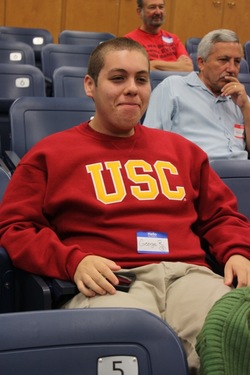
Jorge Rodriguez, Marshall Class of 2010
In 2010, Jorge Rodriguez was an ambitious high school senior navigating his way through the daunting gauntlet of the college application process. A teacher put him in touch with Susan Phillips and Lori Zimmerman, who helped him finalize his essays, whittle down his choices and successfully gain admittance to USC.
Rodriguez expresses the prevailing sentiment that led Lori and Susan to the ground floor of CollegePath LA: “Students had to take initiative, and if they didn’t do that at an early age, they would get discouraged later on.”
He joined a small focus group of students that met at Susan’s house with a clear goal of intervening early in the college application process. “We didn’t want to wait until panic set in,” he says. Together, the group designed a pilot program and curriculum. It came up with a name: CollegePath LA was born.
While he was a student at USC, Jorge served as a coach for several Marshall High School students and helped CollegePath LA expand its mission to reach a broader student population. After graduating from USC in 2014, Rodriguez accepted a position as a science teacher at Jordan High School.
“It’s a very different place,” from Marshall, he says. “We’re fighting back against a lack of motivation, a lack of college desire, and that manifests itself in problems with drugs, alcohol, high dropout rates, and low expectations. It’s a real challenge.”
It’s a challenge that Rodriguez has met with the determined resilience that he brought to CollegePath LA in its infant stages. “I’ve been able to get them to care, to reverse expectations,” Rodriguez reflects. “I think CollegePath is a key factor. I’ve met so many people with different perspectives.
Rodriguez continues to work with CollegePath LA, now as a mentor rather than a student. He tutors Marshall kids in chemistry, while teaching a full load. He pairs them with CollegePath LA coaches. He attends alumni meetings. “What I love most about [CollegePath LA] is that the relationships don’t end on graduation day. It’s for life,” he says.
In 2010, Jorge Rodriguez was an ambitious high school senior navigating his way through the daunting gauntlet of the college application process. A teacher put him in touch with Susan Phillips and Lori Zimmerman, who helped him finalize his essays, whittle down his choices and successfully gain admittance to USC.
Rodriguez expresses the prevailing sentiment that led Lori and Susan to the ground floor of CollegePath LA: “Students had to take initiative, and if they didn’t do that at an early age, they would get discouraged later on.”
He joined a small focus group of students that met at Susan’s house with a clear goal of intervening early in the college application process. “We didn’t want to wait until panic set in,” he says. Together, the group designed a pilot program and curriculum. It came up with a name: CollegePath LA was born.
While he was a student at USC, Jorge served as a coach for several Marshall High School students and helped CollegePath LA expand its mission to reach a broader student population. After graduating from USC in 2014, Rodriguez accepted a position as a science teacher at Jordan High School.
“It’s a very different place,” from Marshall, he says. “We’re fighting back against a lack of motivation, a lack of college desire, and that manifests itself in problems with drugs, alcohol, high dropout rates, and low expectations. It’s a real challenge.”
It’s a challenge that Rodriguez has met with the determined resilience that he brought to CollegePath LA in its infant stages. “I’ve been able to get them to care, to reverse expectations,” Rodriguez reflects. “I think CollegePath is a key factor. I’ve met so many people with different perspectives.
Rodriguez continues to work with CollegePath LA, now as a mentor rather than a student. He tutors Marshall kids in chemistry, while teaching a full load. He pairs them with CollegePath LA coaches. He attends alumni meetings. “What I love most about [CollegePath LA] is that the relationships don’t end on graduation day. It’s for life,” he says.
|
|
By Jonah Rosenbaum
CollegePath LA Volunteer |

